- Home
- Adele Griffin
Tell Me No Lies Page 18
Tell Me No Lies Read online
Page 18
“Oh.”
“You can get it made into anything, like a ring or a necklace, whatever you think it should be.”
I turned it over. The opal was gorgeous, but the gift itself seemed slightly vague and unfinished. “What do you think it should be?”
He frowned. “I don’t know. Maybe it’s the key to unlock what you want most.” He laughed unhappily. “Or maybe it’s just a really sucky gift.”
This wasn’t going right. “No, Matt, I love it. Thank you.” And I tried to feel more thrilled about it, though of course I didn’t have any extra cash to turn a loose stone into a fine piece of jewelry. Quickly I kissed Matt on the lips, my fingers touching the back of his neck, pressing against him. Matt held me a moment, before gathering my fingertips and kissing them quickly. “I really missed ya, Stripes.”
“My mom and dad are close by—they might be home any minute,” I whispered. “I dare you to put your hand up my shirt.” In response, Matt just turned red, and seemed so genuinely embarrassed that I felt bad. “Kidding, kidding,” I said quickly. “Will you grab the milk?”
I stirred in the cocoa powder as Matt sat at the table and told me about Mexico, the surfing and the beach bonfires. He wore a rope bracelet on his wrist, and his shirt was also new, baby-blue linen that I knew his mom had decided on, but made me feel shabby in comparison, in my plain T-shirt and jeans. My solitary confinement of winter break suddenly seemed unfair compared with the casual luxury of Matt’s stories.
“Your face is grumpy.”
“It’s not.”
“It is.” Matt watched me. “I wish I could have taken you with me. A million times I wanted you there, or at least on the phone, to crack up laughing with you.” He was successfully coaxing the smile he needed from me.
“I kept picturing you with some adorable preppy girl.”
“I kept picturing you up all night with your applications.”
“They’re all done. Now I’m sweating about my assembly.”
Matt nodded. “You know how my sister Erin’s stage fright was epic when she was at Argyll. She did her assembly on Yo-Yo Ma and then she played cello. I was in fifth grade, and all I remember was how she talked about it for months.”
“How’d she do?”
“She got an A.”
“You don’t get how scary it is. When you spoke at Walt’s service, it just seemed like you were telling a story at the dinner table.”
Matt looked unhappy. “I had to do right by Walt. I’d never have messed that up.” He was quiet a moment, and it seemed to cost him effort to brighten up his voice when he spoke again. “Anyway, I think playing sports is good practice. Being out there, screwing up for everyone to see. But I’m always nervous on the inside. That’s natural. And you’ve got nothing to be scared of.”
My knees were shaking right now, thinking about everything I was scared of. What harm would it do to tell Matt about my fear of having a seizure? Here it was, just the two of us at the kitchen table, everything close and intimate. “I guess I’m scared because I’m never onstage.”
Matt’s eyes searched mine as he sipped from his mug. Paranoia gripped me. He knew, he’d always known. No, he didn’t have a clue. Because at this point, if he’d heard the music room story, he’d have brought it up himself. It was for me to tell him, if I wanted to tell it. It was my secret, not his.
“So I saw Claire last night,” he said.
I hadn’t expected Claire’s name to barge into the conversation. I was conscious of the quiet in the room. The ticking kitchen clock. The faint upstairs noise of the television. “No carnations for me this time?”
“I was at Dave’s and she was there. They already had plans, and we drove to the city. I thought you should know in case you felt left out.”
Left out was exactly what I’d been. How could I feel anything different? “If the three of you would rather go out together, without me, why do you always have to tell me about it?”
“It’s not like we’d rather go out without you. It just happened that way. They like this bar in the city. We’d been there before, it’s got a relaxed door policy on Sundays.”
“Dave likes the city, but not with me in it.”
“Stripes, that is untrue. He thinks you’re awesome. It’s only that I was already Dave’s friend, and now Claire’s tight with him. Hey, you introduced them, don’t forget.”
“Sure.” I wanted it to make sense, and it halfway did, but it also left me so doubtful. “Claire’s icing me out because of the whole money thing.”
“I asked her about that. She says you just surprised her. She said you’d made it seem like you were flush.”
“That’s not fair.” But now that I’d talked it out with Theo, too, I could see where I’d gone wrong. I’d offered to pay for things too quickly, to be the hero so everything went smoothly.
“Look, I like Claire,” said Matt. “She’s been through some stuff, she’s got interesting—”
“I like her, too,” I interrupted. “But she’s mad at me now—so if you want to spend time with her, just know that right now I can’t.”
Matt looked perplexed. “Aright, got it. And if you and Claire aren’t hanging out right now, I’d rather be with you. There’s a big party out in Glen Mills this Friday, and Jonesy says he’ll drive us all—would you be psyched for that?”
“Yeah, I would, actually.”
“Cool. Settled.” He extended a finger to spin the lazy Susan in the middle of our kitchen table. The shepherd and shepherdess salt and pepper shakers, the napkin holder, and the squeezable bear-shaped honey all spun into a blur.
Dizzy, I blinked and looked away, but I could still feel the spinning in my body, the desire to ask more questions about Claire, about why they’d all become so close, without me. What was Claire telling Matt that she hadn’t told me? I closed my eyes against the vertigo and buttoned my lips against sniping comments. “It’d be fun to do something with Jonesy and Kreo.”
“Yeah.” Matt folded his hand over mine. “Aright, I better beat it.”
At the front door, he kissed me good-bye, and I was overwhelmed with the sensation of having him back again, the warmth of his tanned skin, the crumple of his linen shirt, that faintest hint of citrusy aftershave he sometimes wore that I loved. But when I opened my eyes to look up at him, I was tugged by misgivings that I barely had any intuition about Matt other than a scratchy, aching feeling that as much as he liked me, he also partly wanted to escape me.
No, I wasn’t doing this right, but I didn’t know how to do it any better.
thirty-six
First day back at Argyll was extra noisy with everyone returning from exotic vacations. Seven other seniors besides Gage had gotten into their top-choice schools. They seemed louder and lazier and happier, and I felt out of sync. Being deferred was like a backpack of failure that I had to lug around everywhere. Everyone saw it and everyone knew.
“It sure puts the rest of us on pins and needles till April,” said Mimi as we got ready for sports, Mimi to basketball and me to my dreaded modern dance class. The last thing I wanted to do was leap around the brightly lit studio in my dance tights while the full-length mirror reflected my sullen face and mediocre technique.
“If you say so,” I answered. “I don’t think about it much.” Not like Mimi, who’d applied to a bunch of schools but was obsessed with Berkeley, since it was geographically farthest from Noah. My pretend indifference wasn’t fooling anyone, least of all me. But I had to slam college thoughts into a back closet of my brain, or I’d go crazy thinking about all the possible different rejections in store for me come spring.
When I caught Claire’s eye in homeroom at the end of the day, she stared at a space just past my ear.
Nope, we still weren’t right. Another defeat on my shoulders.
By the next morning, we’d settled back into school
routines. Alison Greely’s “The Origins of Pleasantries and Salutations” was the second-semester kickoff assembly. It went fine.
“Ali Greetings should give another assembly about the origins of apologies,” said Wendy as we all filed out of the theater. “Then she could apologize to us multiple ways for her incredibly stupid assembly.” She was talking in that loud voice that wanted everyone to start laughing and think she was hilarious, and of course a few girls did. But her casual cruelty sent prickles up my neck. Would my assembly remind Wendy to start up all her spaz imitations again? Would I be able to see her make fun of me from the podium? As bad as it would be to have a seizure in front of everyone, it was also horrible to think I’d be ridiculed just for standing up in front of the school.
After lunch, I had to hand off my prepared visuals for Mrs. Robles to make into slides.
“I’m intrigued, Lizzy.” She lifted the top image.
“Thanks,” I mumbled. I wouldn’t breathe easy till this was over.
That afternoon, as I sped through the arts lobby, I nearly smacked into Claire, heading in the same direction.
We both stopped, wild-eyed, like a pair of skittish horses.
“Hey,” I said.
“Hey.”
She had her portfolio hoisted tight under her armpit. It struck me that she had no clue how I’d agonized about her over break, while she was lazing away her days in Florida—or for that matter hanging out with my boyfriend in the city the other night.
“I’m behind in my portfolio concentration,” she said. “Are you?”
“I’m not ahead.” I was amazed that Claire was getting in any of her work on time. It didn’t seem very Claire-ish. “How was vacation?”
“Boring. My dad’s condo is basically a retirement community. What about you?”
“Boring, too. Once I went into Philly. I hit a bunch of museums and galleries, I went down to South Street, did some sketches.” I could feel my smile a little too eager.
Claire made a shrugging motion like steam through her body. “Nice.”
Was Claire going to mention my two-page apology letter, or give me a reason why she never returned any of my calls, or let me know what she’d been up to last night?
“I wanted to—I wished I could have, that you could have—”
“Right. We’re gonna be late.” She broke away from me, pivoting to stride into the art room, leaving me breathless with everything I’d wanted to say to her.
I walked behind her, keeping my distance.
Mr. Custis-Brown, who always took over from his wife teaching Argyll’s spring semester, was waiting for us in the studio. Last fall’s sketches and watercolors had been plucked off the walls, the supply shelves were decluttered, and tables and easels were freshly reconfigured. I was glad that I wouldn’t have to see “Jeanie” this semester, and be reminded about all that secret, sultry flesh.
Claire put on some Pet Shop Boys. Then she scraped her easel to the outer reaches of the room. I sat with Gage and Mimi and pretended to pay attention as they picked up the conversation about their mostly uneventful winter breaks, though I was hardly listening, my eyes snaking over to Claire, wondering if I could count anything that had just happened as a sign that we were thawing out, or that she was finally, once and for all, done with me.
thirty-seven
That afternoon, I had a shift at Ludington, but Matt couldn’t pick me up to take me there, which he sometimes did. The sky was dark as I got off the train, and at the circulation desk, I found Mrs. Binswanger already in her hat and coat. There was hardly anybody else in the library, and later when the snow started to fall in earnest, Dad called the desk phone to say he’d come get me at the end of my shift.
At closing, I put away my homework and finished some tasks, returning the last of the plastic-covered books to the kids’ section, straightening the chairs, and running a Bissell over the faded orange carpet.
When I saw Leslie Spivio hunkered all by herself at a back carrel, I stopped humming. I thought I’d been alone.
“Hey, Leslie.” She popped up, scared by the sound of my voice. “Lights off in five minutes, okay?”
“Okay.”
Leslie was someone I’d known since we were little kids, and I’d always considered her slightly annoying—she made too many classroom announcements, and was often shoving a clipboard under my nose, asking me to give a dollar for this drive or to sign up for that campaign. Girls had remarked on how Leslie had changed since whatever had happened with Stephen. But I’d never been close with Leslie, and it wasn’t until this instant, across the dark, quiet library, that I took stock of how different she seemed from before.
She was wearing a sweater two sizes too big, and her hair hung lank on her shoulders. While she’d lost that pulled-together, laced-up Leslie-ness on the outside, what really seemed different was how her glow was gone. She didn’t look like a girl who had the energy to sign up your name for Meals on Wheels or organize the student coat drive.
“You can leave with me through the back exit,” I told her. “I already locked up the front. We’re supposed to get five or six inches. My dad is waiting in the parking lot. Do you have a ride?”
“I’ve got my car.”
“Okay.”
Leslie had been in the music room, that day in eighth grade. Our secrets about each other were dark water between us, but neither of us knew how to hold out a hand for the other to cross over. What was I supposed to say, anyhow? What were we supposed to cross into? A place where everything was going to be okay? How did I know who got to be okay?
“I need to be last so I can hit the lights, too,” I told her.
“Got it,” she said as she reached for her coat.
Snow was falling hard by the time I raced out to the parking lot.
“Hey, Banana, you’re sure quiet,” Dad said after our silent trip home.
“I’m fine.”
“Nice to be back at school and busy?”
“I guess, compared.”
“It was a mellow vacation,” he agreed.
“Mellow? I was grounded,” I reminded him. “You and Mom made it horrible for me.”
“Easy, champ. Your grades fell, you had debts to pay and a pile of applications to send out after you got deferred. I think Mom and I were indulging in some fairly normal parenting to rein you in a little, no?”
I said nothing. If I’d been allowed to go with Gage to Mad River, she’d have given me time to work on my applications, plus I’d have had her friendship and a few activities to break up the long hours of essay writing.
My parents were always so absolutely sure they were right that sometimes it felt like the wrongest thing about them.
The boys had eaten already, but Mom had kept my dinner warm for me. Next to my bowl of lentil chili and corn bread was a square brown-wrapped package.
“That came in the mail,” she said. “It’s from Massachusetts. What is it?”
“Just a sample yearbook we wanted to look at for yearbook committee.” I was stunned to see it. Not that I’d forgotten, but I’d never thought about what it would feel like when it finally got here. I was burning up in wonder. “We’re checking out different styles. The school expensed it.” I was scared to look at Mom, in case she guessed I was lying.
I inhaled my chili, then ran with the book clutched to my chest, panting slightly as I got to my room, where I locked the door behind me and ripped open the packaging.
The outside of the yearbook was bottle green, the cover board a finer grain than what our own school budget could afford, and the binding was more expensive, too. Its center was embossed with the words The Strickland Lamp beneath a tiny foil-stamped emblem that looked like a genie’s magic lantern.
I ran my finger over the spine, beautiful, then opened and flipped right to the senior class pages. I’d never learned his last name, b
ut that wouldn’t matter, I’d find him soon enough. Jay could also be a nickname for Jason, James, Jeremy, Jacob—he could be a lot of kids. My eyes scanned the pages, four students on a page, maybe fifty pages, about two hundred seniors, half boys.
There was a senior named James Lancing, but his entire life seemed to be about basketball. Another senior named Justin MacCallum looked too blond and spindly to meet Claire’s description.
He had to be here. I checked the smaller photo squares of the junior class, where I found Claire’s photograph, smiling and all-American. The juniors offered a James Brunt and a John de la Salle—one too freckled, the other too brawny. The sophomores gave me a J. P. Barclay, a ruddy-faced class clown who was wearing a tuxedo T-shirt beneath his sports jacket. With some desperation, I turned to the freshmen. Maybe this was Claire’s shame? Had she been in love with a lowly freshman? I found a Jay Luis who looked about twelve.
Of the dozen prefects, none of them had a name starting with J or Jay.
I tried searching like a psychic, feeling it out, imagining that Jay would suddenly sharpen like a familiar face in a crowd, in a microsmirk or an adorable forelock of hair falling over his eye. I imagined him looking like the haunted schoolboy Ian Curtis from Joy Division. I imagined him as bold and suave as Dave Jimenez.
On the other hand, Claire was everywhere.
We’d almost finished assembling a mock-up of the Argyll yearbook, and Claire hadn’t bothered showing up for any of the official sports and clubs photos. She was a ghost at Argyll—but at Strickland, she burned with life. Like Gage, she played three different sports, and even as a junior, Claire was varsity in every one of them, front and center in all team pictures, and a cocaptain in lacrosse. Instantly recognizable and yet chillingly different, like some firebrand twin sister to the Claire Reynolds I knew today.
She was also in French club, but nope, no Jay in French club, either, and wouldn’t a guy who was fluent in French and living in Paris be hamming it up in French club? In the community service section, I discovered Claire in a shot headlined “Basil County School,” where she stood in a cluster of elementary school children, a few in wheelchairs, their smiling faces blanched by photo overexposure. Strickland takes pride in our long relationship with Basil County School, tutoring at-risk youngsters with physical disabilities and emotional needs, read the caption, along with a quote: “I always wanted to be a big sister. When I spend time with BCS, I feel like I get a bunch of sisters and brothers all at once!”—Claire Reynolds, ’89.

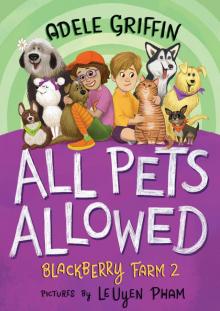 All Pets Allowed
All Pets Allowed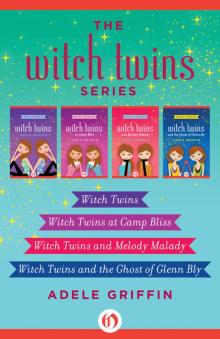 Witch Twins Series
Witch Twins Series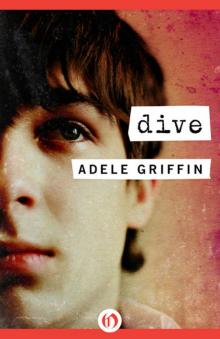 Dive
Dive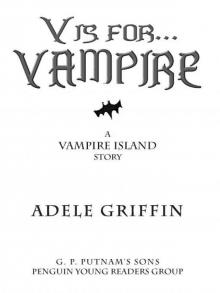 V is for...Vampire
V is for...Vampire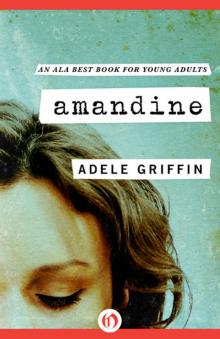 Amandine
Amandine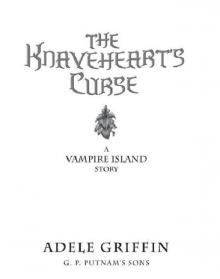 The Knaveheart's Curse
The Knaveheart's Curse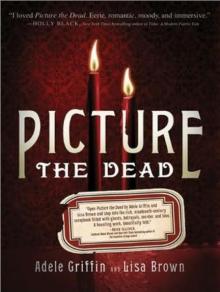 Picture the Dead
Picture the Dead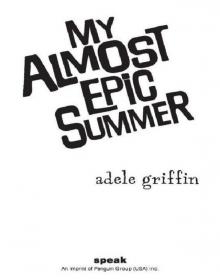 My Almost Epic Summer
My Almost Epic Summer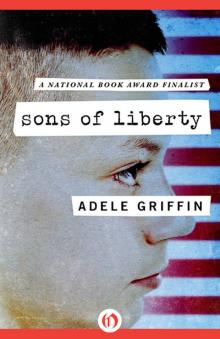 Sons of Liberty
Sons of Liberty Overnight
Overnight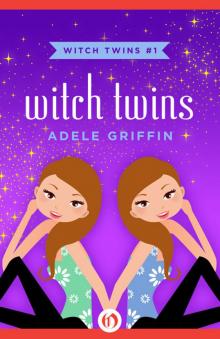 Witch Twins
Witch Twins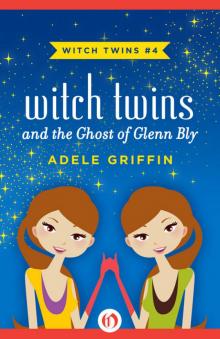 Witch Twins and the Ghost of Glenn Bly
Witch Twins and the Ghost of Glenn Bly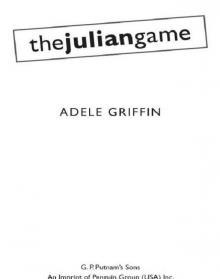 The Julian Game
The Julian Game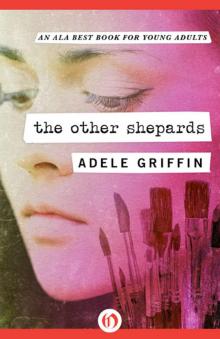 Other Shepards
Other Shepards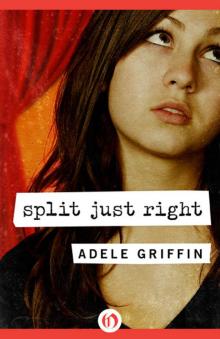 Split Just Right
Split Just Right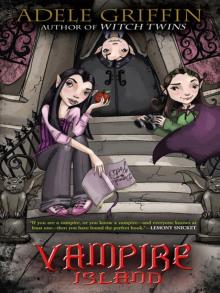 Vampire Island
Vampire Island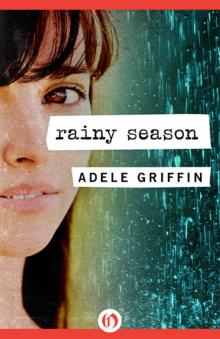 Rainy Season
Rainy Season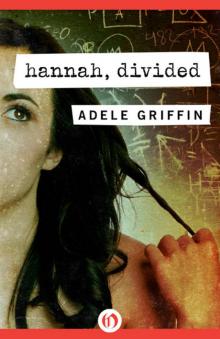 Hannah, Divided
Hannah, Divided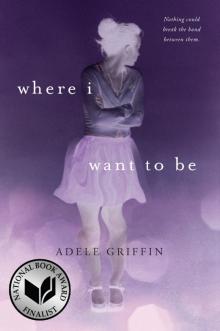 Where I Want to Be
Where I Want to Be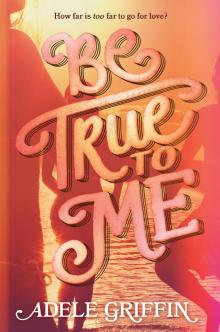 Be True to Me
Be True to Me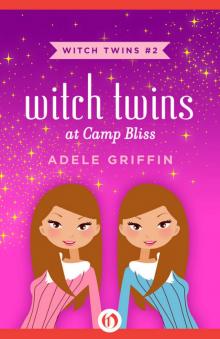 Witch Twins at Camp Bliss
Witch Twins at Camp Bliss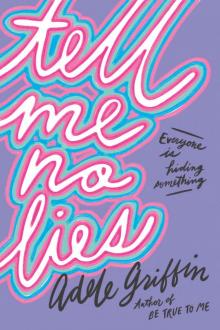 Tell Me No Lies
Tell Me No Lies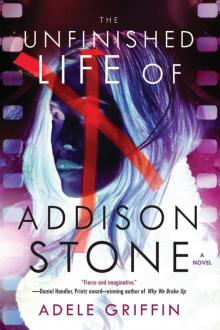 The Unfinished Life of Addison Stone
The Unfinished Life of Addison Stone